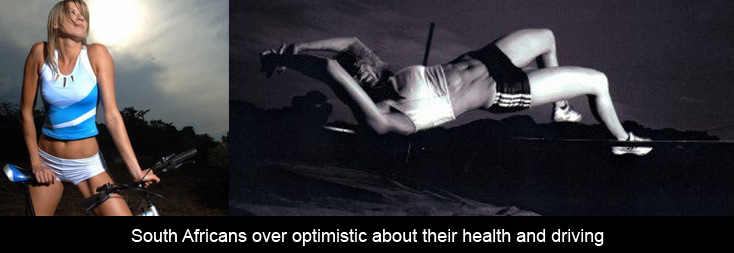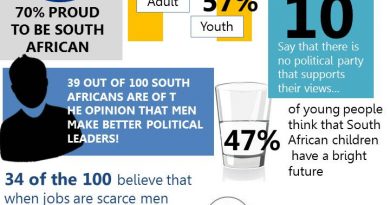South Africans over optimistic about their health and driving
Discovery research study finds that individuals are over optimistic about their health and driving ability
Johannesburg, 1 August 2012, – Over the past year, Discovery conducted several surveys among South African employees and its Discovery Insure members to determine how they rated their state of health and their driving abilities. The results of these surveys show that people’s perceptions of themselves and their abilities do not always correspond with the reality, and are usually over optimistic.
Dr Craig Nossel, Head of Discovery Vitality Wellness, says the results of the first Discovery Healthy Company Index (HCI), which were released last year, are interesting. “Statistics show that South African employees are not as healthy as they perceive themselves to be, indicating that a distortion exists between perception and reality,” he says.
The survey results indicated that 67percent of all employees who participated in the HCI considered themselves to be healthy when they actually had four or more risk factors affecting their overall health and wellbeing. Other interesting statistics revealed that:
• 21 percent were already living with a chronic lifestyle disease such as diabetes, high cholesterol and high blood pressure
• 21percent were smokers
• 61 percent were overweight or obese
• 78 percent were not getting enough exercise
• 80 percent were not eating enough fruit and vegetables
• 67 percent were stressed
• 61 percent were not doing regular health checks
• 72 percent of all respondents had a *Vitality Age that was on average 3.5 years above their actual age.
81 percent of Discovery Insure vehicle insurance clients think they are excellent drivers
Similar perception results were found among Discovery Insure drivers when over 114 million kilometres of driver data generated by the **DQ-Track programme was analysed. Anton Ossip, Discovery Insure CEO says, “out of the group who considered themselves to be excellent drivers, our data shows that a very small percentage of these drivers are actually excellent drivers.”
The survey showed that 10 percent are excellent drivers, 58 percent moderate, and 32 percent poor drivers. Ossip says that the survey also found that young adult drivers (between the ages of 18 and 25) are over optimistic about their driving abilities, with nine in 10 young adults believing they are above average or excellent drivers. In a recent survey done by Discovery Insure we found that over 75 percent of young adult deaths are caused by motor vehicle accidents. The young adults survey also showed that:
• Over 90 percent of young adult drivers are most likely to engage in risky driving behaviour
• The top three risky behaviours are peer-influenced behaviour, late night driving (after 11pm) and speeding
• 60 percent of motor vehicle accidents in the country are preventable as they occur before some form of irresponsible or risky driving behaviour.
This propensity for over optimism is not unique to South Africans. Research completed in the US showed that close to 20 percent of the population believed that they belong to richest 1 percent of the population and 80 percent of students believed that they are in the top 50 percent of their class.
It’s time to change behaviours
People will not change their behaviour for the better if they do not think it is a problem, and changing behaviour is difficult when people have unrealistic perceptions about their actual health and driving behaviour.
“Changing behaviour requires more than information and prescription; it requires meaningful environmental or structural changes,” says Nossel. “People, with the help of regular feedback, will usually change their behaviour when they realise how their choices negatively affect their quality of life.”
This applies to their driving abilities as well. The young adult driver research, Ossip says, shows that “young adults are more receptive to having telematics technology installed in their cars than their parents are, and 80 percent of young drivers want feedback on all aspects of their own driving behaviour.”
Discovery addresses this behavioural perception distortion through behavioural economics application that helps people make positive behaviour changes through rewards when they make healthier lifestyle and better driving choices based on regular feedback through doing various health checks, and through DQ-Track feedback. Discovery, says Nossel, “is committed to ensuring a healthier, more productive society, and that South African roads are safer for all to use.”
Also view:
[Image with recognition to Brigitte Willers, TheJogBlog]




